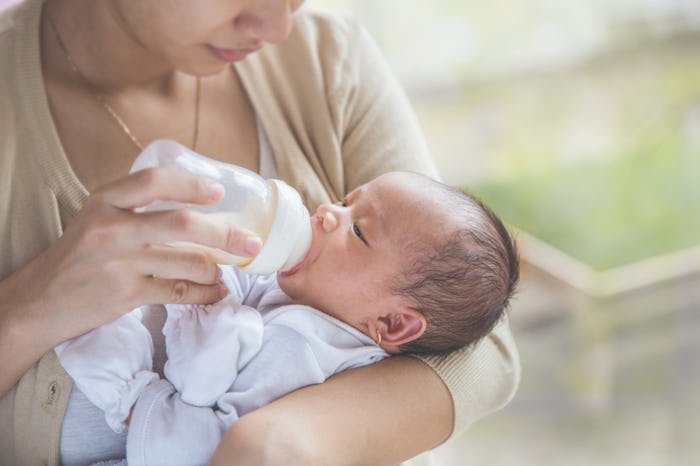Life

Organic Formula Sounds Necessary, But Here's What Experts Want You To Know
When you're a mom, there are so many things to consider. Like which diapers are the best brand, which wipes are the most gentle (but still get the job done) — you learn as you go which brands are your favorite, and formula is no different. Whether or not you're breastfeeding, chances are you'll experiment with formula at one point or another. Finding a brand you and your baby like can be hard, and you might be considering an organic formula brand. But is organic formula worth it?
Buying organic can get expensive, especially for parents who really need to stick to their budget. But whatever your situation, it's always good to know whether or not something that costs more is actually worth more. I checked in with Dr. Alissia Zenhausern, a Naturopathic Physician at NMD Wellness in Scottsdale; Andrea Tran, a Registered Nurse, Lactation Consultant and writer of the blog Breastfeeding Confidential; and Liza Janda who is a Certified Lactation Education Counselor and writer of the blog Yoga Janda, to see if organic formula is worth the extra cost.
A lot of people swear by organic brands and wouldn't even consider buying anything without the "organic" label. But, when it comes to baby formula, Janda says, "I don't think spending extra money on organic formulas is worth the money. If one is going to spend extra money on formula, they should spend it on hydrolysate formulas." She explains that hydrolysate formulas are formulas with proteins that are broken down, making them easy to digest, which could be a good option for infants who are experiencing tummy trouble.
Tran says that when it comes to buying organic formula, moms should consider the differences and decide what's important to them. According to Tran, the main differences are that "organic formula is made with pure cane sugar whereas most other formulas are made with high fructose corn syrup. Organic formula is not made with any GMOs."
If you do decide to go organic, you should know that it matters what kind of organic certification your formula has. Dr. Zenhausern says, "There is a difference between Organic and USDA organic, and this is really important — USDA organic is what new moms should be looking for on labels when searching for high quality organic product. The reason is because in order to have a USDA organic label on any food, it must be verified by a USDA-accredited certifying agent and will [be] under stricter guidelines in order to prove its quality." She warns moms that a label that simply says the word "organic" or "natural" is nothing more than a "marketing ploy," and you will waste money spending more on a product that is not actually organic.
But buying real organic foods can limit your ingestion of herbicides and pesticides, according to experts. So when it comes to organic formula, you should speak with your pediatrician to get more info. Some brands Dr. Zenhauser recommends for moms are Similac, Organic Sensitive Infant Formula by Honest Company, and Baby's Only Organic Formula by Nature's One LactoRelief DHA. But you won't know what's best for you and your baby until you try. Don't let the words throw you off — feeding your baby is important, and that can look different for every mom. Weigh your options, talk to your child's pediatrician, and make the decision that's best for you and your baby.
This article was originally published on